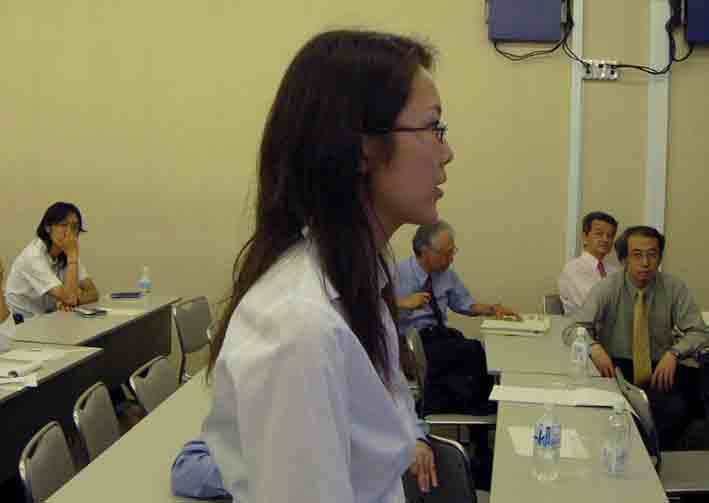トップページ > Events & Forums > 公共経済政策ワークショップ > 2004年度夏学期
公共経済政策ワークショップ
2004年6月18日 ミニ国際カンファレンス 「日本の政策課題と解決策」
「 日本経済の進化 」 "Economic Transformation of Japan"
ヒュー・パトリック (コロンビア大学教授)
 1990’s was a lost decade for Japan in terms of macro level since GDP growth rate was low. However, it was not the lost decade in terms of micro level, especially in institutional dimensions. Under the surface, institutional structure and mindset of managers or public servants have started to change over this decade. This is a fundamental transformation from a conventional growth model, catching up to the West, to a more matured growth model with market oriented economic structure allowing diversity among institutions. Now, the youth in Japan are challenged by the new types of difficulties as well as different opportunities that is beyond the conventional wisdom can deal with.
1990’s was a lost decade for Japan in terms of macro level since GDP growth rate was low. However, it was not the lost decade in terms of micro level, especially in institutional dimensions. Under the surface, institutional structure and mindset of managers or public servants have started to change over this decade. This is a fundamental transformation from a conventional growth model, catching up to the West, to a more matured growth model with market oriented economic structure allowing diversity among institutions. Now, the youth in Japan are challenged by the new types of difficulties as well as different opportunities that is beyond the conventional wisdom can deal with.
TRANSFORMATION OF JAPANESE ECONOMY
1. MAIN BANK SYSTEM is weakening. In70s and 80s, main banks worked as a financial monitor of companies and prevented bankruptcies in advance. However, after the bubble burst, they lost their control. Capital condition has worsened over the course of last 20 years. Moreover, the structural adjustment afterwards was slow. Banks are now focusing mainly on smaller sized companies since large corporations are utilizing direct financial market. Banks have already almost overcome non performing loan problem. The fundamental problem now is not the banking system, but a profitability of banking business. For example, banks are behind in IT systems (e.g. Seven-Eleven has faster cash transfer system than Japanese banks do). This is boiled down to the problem of MINDSET of senior managers who don’t understand the cause of problem or have no incentives to lead drastic change.
2. PERMANENT EMPLOYMNT SYSTEM will be kept by some companies in a different way by introducing incentive system. Companies are giving more responsibilities to employees and introducing rapid promotion system based on their ability. At the same time, permanent employment system is loosing its credibility and labor market is getting more liquid. One big concern here is the growing number of young workers in a part time job market and high unemployment rate of young workers.
3. MANAGEMENT TARGET has been shifted from employee oriented style to share holders oriented style. Managers are now more conscious about profits and transparency of management, yet they will try to entrench the power in business as they have been.
4. JAPANESE BEAUROCRACY has been relatively clean on the surface compare to other Asian countries, yet a crucial problem is that the public servants are trained to administrate bad laws without critical analysis. As Prof.HamadaKoichi at Yale claimed, they are lack of training of ANALYTICAL and CRITICAL THINKING, although they are the ones who must know social objective or analytical purpose of policies. Always question: what is the nature of the analysis?. Besides, further deregulation needs to be continued, yet protected industries will remain at some degree.
Q and A
Q. Are we really facing a depression? For us who was born in 80s, the post war growth seems abnormally high and 90s is somewhat stable.
A. Income inequality is not so bad relative to US. Only 2% of the population have less than 2,000,000 yen family income comparing to US with that of 14%. On the whole, Japan is not doing so badly. The important issue is Japanese economy has underemployed or miss-allocated resources to be adjusted.
Q. What kind of policy will work to prevent the trend of high unemployment rate in youth?
A. Enlarge overall GDP. Paradox of theft in 70s caused low aggregate demand: saving is too much for investment. Also, too strict fiscal policy during 90s was not good. Government spending has increased in a very political way. Instead, reduce consumption tax and encourage people to consume more.
 Q. How to prevent income inequalities in the future?
Q. How to prevent income inequalities in the future?
A. Point is how to take care of low income population. Let the winners win. Japan has protected producers who are potentially low income or unemployed. But it is not efficient approach. Job training will work only for younger people. Well targeted income subsidies may work.
